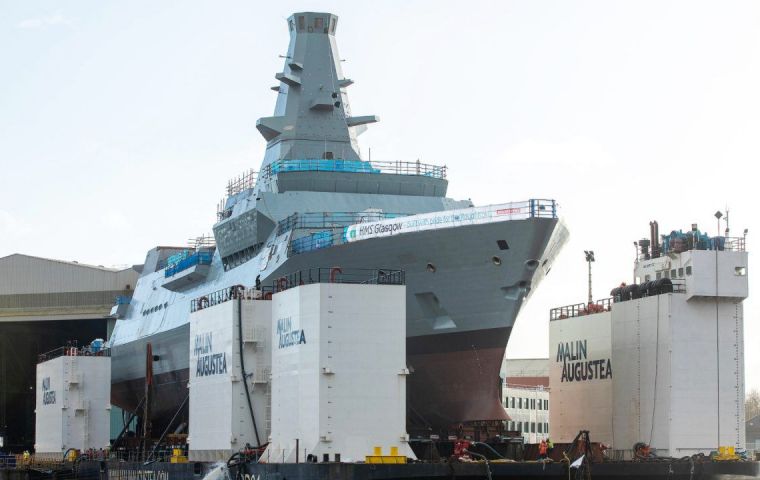MercoPress. South Atlantic News Agency
Type 26 frigate HMS Glasgow will “test” the Clyde river for the first time
 The ship is structurally complete and was slowly rolled from the shipyard's hard standing in Govan, Glasgow, on to a barge for transport down river to Scotstoun
The ship is structurally complete and was slowly rolled from the shipyard's hard standing in Govan, Glasgow, on to a barge for transport down river to Scotstoun HMS Glasgow is set to enter the water for the first time as the construction of the Royal Navy's new Type 26 frigates hits a new milestone. Last week she was moved on to the Clyde for the first time.
The ship is structurally complete and was slowly rolled from the shipyard's hard standing in Govan, Glasgow, on to a barge for transport down river to Scotstoun for the next stage of her build.
The 149-metre warship will be taken to deeper water where the barge will be submerged, allowing HMS Glasgow to float for the first time.
The base of the barge will sink slowly over a number of hours until the ship fully enters the water. After arriving at Scotstoun shipyard, HMS Glasgow will undergo further outfit, testing and then commissioning.
Defense Secretary Ben Wallace praised the “remarkable achievement” of shipbuilders and said the Type 26 was coming out of the shipyard late but not “catastrophically” so, saying he is confident HMS Glasgow and the other frigates will enter service in time.
Brigadier Andy Muddiman RM, Naval Regional Commander Scotland & Northern Ireland, said: “The floating of HMS Glasgow today represents an important milestone in the build of the Royal Navy's latest anti-submarine warfare frigate.
”This is the first of eight Type 26 frigates being built by BAE Systems in Glasgow.
“The Royal Navy's exciting program of shipbuilding in Scotland, which includes five Type 31 general-purpose frigates being built by Babcock International in Rosyth, will generate jobs, skills and economic benefits in Scotland for many years to come.”
The float-off process is a modern, efficient and low-risk way for a ship to enter the water compared to previous dynamic launches. It is a process that has been used for the five Batch 2 Offshore Patrol Vessels (HMSs Tamar, Spey, Trent, Medway and Forth) built by BAE Systems in Glasgow, the last of which was delivered to the Royal Navy in 2020.
The Type 26 is designed for anti-submarine warfare and high-intensity air defense and can be adapted to supplying humanitarian aid during a disaster relief effort. HMS Glasgow is expected to enter service by 2028.




Top Comments
Disclaimer & comment rulesCommenting for this story is now closed.
If you have a Facebook account, become a fan and comment on our Facebook Page!